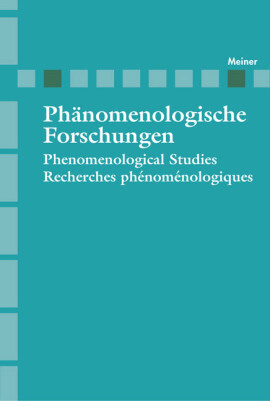
ZEITSCHRIFTENHEFT
Bd. 2010 (2010), Heft 0: Phänomenologische Forschungen 2010
Herausgeber:
Phänomenologische Forschungen, Bd. 2010
(2010)
In diesem Heft

Grenzenlose Verantwortung
Freiheit und Schuld bei Dostojewski und SartrePhänomenologische Forschungen, Bd. 2010 (2010), Heft 0 : S. 5–21

Die Kategorien des Sinnlichen. Zu Husserls Kategorienlehre
Phänomenologische Forschungen, Bd. 2010 (2010), Heft 0 : S. 23–39

Bild und Ding
Heideggers Auslegung der Husserlschen BildlehrePhänomenologische Forschungen, Bd. 2010 (2010), Heft 0 : S. 41–58

Verteilung der Apriori in der Phänomenologie Husserls
Phänomenologische Forschungen, Bd. 2010 (2010), Heft 0 : S. 59–74

Kunst, und doch Methode?
Überlegungen zu Husserl, Heidegger und GadamerPhänomenologische Forschungen, Bd. 2010 (2010), Heft 0 : S. 75–99

Der Begriff ‚Anlage‘ als Bestimmung des Seins bei Martin Heidegger
Phänomenologische Forschungen, Bd. 2010 (2010), Heft 0 : S. 101–116

Logique transcendantale et philosophie du monde de l’expérience. La critique husserlienne de Rickert en 1927
Phänomenologische Forschungen, Bd. 2010 (2010), Heft 0 : S. 117–141

A Solution to the ‘paradoxical’ Relation between Lifeworld and Science in Husserl
Phänomenologische Forschungen, Bd. 2010 (2010), Heft 0 : S. 143–165

Edmund Husserl: Idealisierung und Doxa
Phänomenologische Forschungen, Bd. 2010 (2010), Heft 0 : S. 167–190

Das erzählte Selbst. Ein alternativer Entwurf von Authentizität in Heideggers frühen Freiburger Vorlesungen
Phänomenologische Forschungen, Bd. 2010 (2010), Heft 0 : S. 191–213

Bericht zur Tagung „Die innere Logik der Kreativität“, Würzburg, 1.-2. Oktober 2010
Phänomenologische Forschungen, Bd. 2010 (2010), Heft 0 : S. 215–217

Tagesankündigung
Force of Things, Kraft der DingePhänomenologische Forschungen, Bd. 2010 (2010), Heft 0 : S. 253–257


 Powered by CloudPublish
Powered by CloudPublish